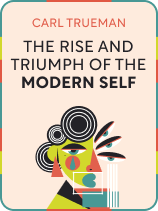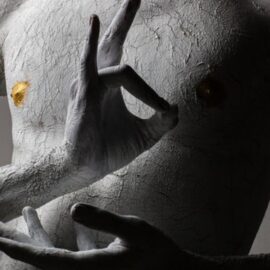

This article is an excerpt from the Shortform book guide to "The Rise and Triumph of the Modern Self" by Carl Trueman. Shortform has the world's best summaries and analyses of books you should be reading.
Like this article? Sign up for a free trial here.
How do you know when you’re being oppressed? Is pornography harmful? Is marriage being expanded—or destroyed?
Carl Trueman asserts that Christian values in society have been impacted in destructive ways by a transformed understanding of the self. He explores two major effects on modern society: the prioritization of feelings and the rise of the LGBTQ+ movement.
Keep reading to understand Trueman’s arguments.
Prioritizing Feelings
Trueman explains that modern selfhood encourages people to place a much greater emphasis on feelings over objective truths, morals, or reasoned arguments. He states that this change in priorities has undermined Christian values in society, reshaping culture in three distinct ways.
1) Oppression Is a Feeling
Trueman contends that because modern people prioritize feelings, many young people equate feeling discomfort with being oppressed. Recall that Freudian Marxists redefined oppression as psychological domination. Therefore, feeling bad when hearing speech one disagrees with can be framed as a form of oppression. Trueman explains that this tendency is most prevalent in leftist activism on college campuses, where simply expressing traditional points of view is seen as a form of oppression. He contends that this change has rolled back freedom of speech on campuses while undermining the mission of higher education, which includes challenging students’ assumptions.
(Shortform note: In The Coddling of the American Mind, Greg Lukianoff and Jonathan Haidt argue that the problem of viewing oppression as a feeling has been compounded by a broadening definition of trauma. While the term once referred to the lingering psychological effects of extremely negative life experiences, Lukianoff and Haidt contend that it has grown to encompass any psychological discomfort. Since encountering challenging ideas can be uncomfortable, this broad definition of trauma equates hearing uncomfortable views with long-term psychological damage. Ultimately, this conflation lends moral credibility to silencing views that students find uncomfortable in the name of protecting their mental health.)
2) Pornography Is Ubiquitous
Trueman contends that the modern self has paved the way for the widespread acceptance and normalization of pornography. If sexual desires are simply part of an authentic life, then there is very little moral ground to object to fulfilling those desires by consuming pornography. Furthermore, those who object to pornography may be cast as trying to impose a restrictive puritanism on others.
Trueman maintains that pornography is highly destructive to morality. By prioritizing the gratification of the individual consumer, pornography detaches sexuality from its greater moral context of relationships and procreation.
(Shortform note: A growing body of research is identifying the detrimental impacts of pornography. Many users have found themselves addicted and struggling to control their pornography consumption. Researchers have found that it can also be detrimental to relationships as heavy users may lose sexual interest in their partners. Furthermore, adolescent males may learn distorted expectations about sex that will then impact their future relationships. However, some psychologists maintain that people with pre-existing mental health conditions are at much greater risk for pornography addiction and that the distorted messaging for young males can be counteracted through education.)
3) Normalization of Abortion
The prioritization of feelings has resulted in a widespread normalization of abortion. Trueman explains this is because the rationale for abortion rests on the well-being of the parents. If a child would make them happy, then they allow it to be born. However, if a child would make the parents unhappy, then it’s acceptable to take the child’s life. Trueman holds that abortion destroys the life of a child and that its widespread normalization devalues human life.
(Shortform note: Trueman’s analysis here focuses largely on Western history and culture. Outside of this context, individualistic parental goals can play a very different role in moral debates over abortion. For example, countries such as China, Iran, and Vietnam have adopted anti-natalist policies to lower birth rates and prevent overpopulation. In China, these policies have resulted in forced abortions and sterilizations. In these cultural contexts, the individualistic desire of the modern self is to have children—but is subordinated to the economic goals of state authority figures.)
The Rise of the LGBTQ+ Movement
Trueman contends that the rise of the LGBTQ+ movement—a political alliance organized around the interests of gay, lesbian, and transgender people—depends on an understanding of the self that is individually determined, at odds with traditional culture, and highly sexual. Furthermore, Trueman explains that this movement’s aims are opposed to traditional Christian values and destructive to the continuation of Christian culture. In this section, we’ll discuss how the modern self shaped the LGBTQ+ movement, transgender identity, and modern understandings of marriage.
1) The Modern Self Shaped the LGBTQ+ Movement
The modern self played an essential role in forging a political alliance of gays, lesbians, and transgender people. Trueman asserts that these groups aren’t necessarily natural allies. For example, during the 1970s, many lesbian feminists argued that their sexuality was deeply rooted in an embodied experience of femininity, and not simply the female equivalent of male homosexuality.
Furthermore, the identities of gays and lesbians are based on an understanding of gender that contradicts the claims of transgender identity. The defining feature of homosexual identity is an attraction to the same gender. For this to exist, gender needs to be a relatively stable category. Trueman asserts that transgender identity requires the rejection of gender as a stable category. The individual is free to declare themselves a different gender because these categories have no stable or continuous essence.
However, a shared modern understanding of the self brought gays, lesbians, and transgender people together into an alliance. Recall that a modern self places authenticity in tension with society and places sexuality at the core of authenticity. Because each of these groups saw their authentic sexual identities as being in tension with society, this created a shared sense of victimhood that bonded the alliance.
2) The Modern Self Shaped Transgender Identity
Trueman asserts that transgender identities are the product of modern selfhood. To claim that someone’s real gender is the opposite of their biological sex, the internal, feeling self must take priority over external conditions.
Furthermore, a sense of oppression from persecution fundamentally shapes trans identity. Recall that the modern self places authenticity in opposition to culture. Therefore, those who advocate traditional gender identities can be cast as antagonists to authentic selfhood. And because Freudian Marxists defined oppression as psychological, those who reject transgender identities are now widely seen as “oppressors.” Thus, the widespread acceptance of transgender identities in the context of modern selfhood directly leads to the moral stigmatization of traditional Christians.
3) The Modern Self Redefined Marriage
Lastly, Trueman maintains that a redefinition of marriage is an inevitable outcome of the modern conception of selfhood. He makes this case by contrasting traditional Christian marriage with the modern view of marriage.
Traditional Christian marriage fulfills the sacred purpose of creating children and a stable home for them. The modern conception of marriage makes marriage about the emotional fulfillment of the partners getting married. Trueman pushes back on defenders who claim that this is merely an expansion of traditional marriage. Instead, Trueman considers this a destruction of traditional marriage, because this detaches marriage from the sacred moral framework and places it in the framework of the modern, feeling self.

———End of Preview———
Like what you just read? Read the rest of the world's best book summary and analysis of Carl Trueman's "The Rise and Triumph of the Modern Self" at Shortform.
Here's what you'll find in our full The Rise and Triumph of the Modern Self summary:
- How the modern conception of selfhood has changed over the centuries
- How Christian views have become stigmatized, damaging Western culture
- What modern Christians can do to preserve traditional values






